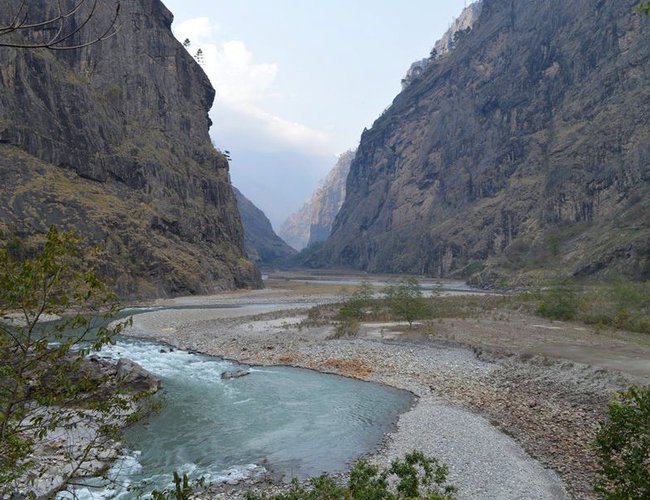
Nepal is expected to formally cancel a deal with a Chinese state-owned company to build one of the country’s biggest hydropower plants, according to its deputy prime minister.
In a tweet on Monday afternoon, Deputy Prime Minister Kamal Thapa said the plan to award the US$2.5 billion hydroelectric project to China Gezhouba Group had been scrapped.
“In the meeting of the Board of Ministers held today, the agreement with the Gezhouba Group in respect of Budhi Gandaki Hydro Electric Project was found in an irregular and thoughtless manner and rejected under the direction of Parliamentary Committee,” he said.
The two parties signed a memorandum of understanding in June to build the 1,200MW hydropower plant about 80km from Kathmandu, inking the deal less than a month after Nepal formally agreed to take part in Beijing’s “Belt and Road Initiative”.
The agreement’s cancellation is expected to be a major setback for Beijing as it seeks to expand its influence in the Himalayan country through the massive infrastructure drive.
Could Nepal’s new communist alliance lead to closer ties with China?
Dinesh Kumar Ghimire, a spokesman for Nepal’s Ministry of Energy, said he believed the decision was final.
“Since [the deputy prime minister] put the decision on Twitter, this must be a decision made by the cabinet,” Ghimire said. “Hopefully we will get an official announcement [on Tuesday].”
A Nepal-based public relations officer for Gezhouba said the company had not been notified about the change, adding the original memorandum was expected to be turned into a formal contract next year.
China and India have been vying for influence in the strategically important Himalayan nation, which also has great potential to generate hydroelectric power.
Gezhouba already has at least two hydropower contracts in Nepal, while Chinese companies are also building hospitals, roads, and airports in the country.
While New Delhi has stayed away from Beijing’s belt and road infrastructure drive, the Nepalese government led by former prime minister Pushpa Kamal Dahal signed up for the initiative in May.
Some had questioned whether Nepal could continue to support such links with China after Sher Bahadur Deuba took over as prime minister in June.
Nepal’s ‘balancing act’ continues as deputy prime minister heads for economic talks in Beijing in August, Deuba told visiting Chinese Vice-Premier Wang Yang that his government remained committed to implementing past agreements, including those on the Belt and Road Initiative, according to The Kathmandu Post.
Sun Shihai, a specialist on China’s relations with South Asia at the Chinese Academy of Social Sciences, said various factors might have played a part in the decision to abandon the hydro deal.
“It could involve environmental groups, domestic politics or other interest groups,” Sun said. “The Nepalese government still needs China badly for its infrastructure construction.”
Courtesy: South China Morning Post
- TANAHU HYDROPOWER PROEJCT: A Significant Achievement
- Apr 15, 2024
- AMBASSADOR HANAN GODAR: Sharing Pain With A Nepali Family
- Mar 30, 2024
- VISIT OF KfW AND EIB TO NEPAL : Mission Matters
- Mar 25, 2024
- NEPAL BRITAIN SOCIETY: Pratima Pande's Leadership
- Mar 24, 2024
- NEPAL ARMY DAY: Time To Recall Glory
- Mar 15, 2024
















